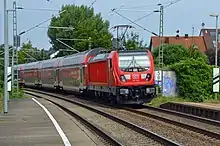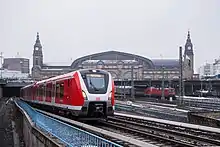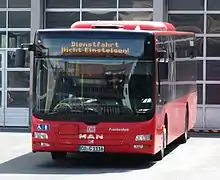DB Regio
DB Regio AG is a subsidiary of Deutsche Bahn which operates regional and commuter train services in Germany.
| Type | Aktiengesellschaft |
|---|---|
| Industry | Transport |
| Founded | June 1, 1999 in Frankfurt, Hesse, Germany |
| Headquarters | , |
| Parent | Deutsche Bahn |
| Website | www |
Germany
Unlike its long-distance counterpart DB Fernverkehr, DB Regio does not operate trains on its own account. Services are ordered and paid for by the Bundesländer or their Landkreise. Some states have awarded long-term contracts to DB Regio (usually 10 to 15 years).
The headquarters of DB Regio in Frankfurt is responsible for the business development and focuses on the framework and service functions for the regional units in the conclusion of transport contracts and tenders. In addition, it supports the regions in the areas of price and revenue management, marketing and traffic planning. In addition, the S-Bahn Berlin, Hamburg, Munich, Rhein-Main and Stuttgart are coordinated and controlled by the headquarters.
Rail division (DB Regio Schiene)

The rail division is divided into seven regions. In addition, there are five urban commuter trains (S-Bahn), which are run directly from the headquarters, as well as the independent regio networks (RegioNetz).
- Regions:
- DB Regio Baden-Württemberg (Baden-Württemberg)
- DB Regio Bayern (Bavaria)
- DB Regio Mitte (Hesse, Rhineland-Palatinate, Saarland) (was created on January 1, 2017 through the merger of DB Regio Hessen and DB Regio Südwest)
- DB Regio Nord (Bremen, Hamburg, Lower Saxony, Schleswig-Holstein)
- DB Regio Nordost (Berlin, Brandenburg, Mecklenburg-Vorpommern)
- DB Regio NRW (North Rhine-Westphalia)
- DB Regio Südost (Saxony, Saxony-Anhalt, Thuringia)
- S-Bahn:
- S-Bahn Berlin
- S-Bahn Hamburg
- S-Bahn München
- S-Bahn Rhein-Main
- S-Bahn Stuttgart
- DB RegioNetz Verkehrs GmbH:
- Erzgebirgsbahn (Saxony)
- Kurhessenbahn (North Hesse and North Rhine-Westphalia)
- Oberweißbacher Bergbahn (Thuringia)
- SüdostBayernBahn (Lower Bavaria and Upper Bavaria)
- Westfrankenbahn (Lower Franconia and northern Baden-Württemberg)
Bus division (DB Regio Bus)
The bus division includes 23 bus companies, which in turn own majority interests in other bus companies. With about 725 million passengers and a traffic volume of 8.4 billion passenger kilometers, DB Regio Bus is one of the largest providers of German bus transport. Nationwide, around 13,400 buses are used. As of 2014, the market share in the regular bus market in Germany is about 9 percent.
.jpg.webp)
- Weser-Ems-Bus (Bremen)
- Autokraft (Schleswig-Holstein)
- Südniedersachsenbus (Lower Saxony)
- Westfalenbus (North Rhine-Westphalia)
- Ostwestfalen-Lippe-Bus (North Rhine-Westphalia)
- Rheinlandbus (North Rhine-Westphalia)
- Rhein-Nahe-Bus (Rhineland-Palatinate)
- Rhein-Mosel-Bus (Rhineland-Palatinate)
- Busverkehr Hessen (Hesse)
- Südwestbus (Baden-Württemberg)
- Rhein-Neckar-Bus (Baden-Württemberg)
- Regiobus Stuttgart (Baden-Württemberg)
- Südbadenbus (Baden-Württemberg)
- Oberbayernbus (Bavaria)
- Untermainbus (Bavaria)
- Ostbayernbus (Bavaria)
- Frankenbus (Bavaria)
- DB Regio Bus Ost GmbH (Brandenburg)
- Busverkehr Märkisch-Oderland (Brandenburg)
- Busverkehr Oder-Spree (Brandenburg)
- BEX Bayern Express & P. Kühn GmbH (Berlin)
Sweden
ÖstgötaTrafiken has given DB Regio Sverige a contract to operate local trains for 10 years from December 12, 2010.[1]
UK
Since Deutsche Bahn's purchase of Arriva in January 2010, DB Regio's operations in the United Kingdom are now known as Arriva UK Trains.
See also
- S-Bahn
- Berlin S-Bahn
- Dresden S-Bahn
- Hamburg S-Bahn
- Hanover S-Bahn
- Magdeburg S-Bahn
- Mitteldeutschland S-Bahn (Leipzig / Halle (Saale))
- Munich S-Bahn
- Nuremberg S-Bahn
- Rhein-Main S-Bahn (Frankfurt / Mainz / Wiesbaden)
- Rhein-Neckar S-Bahn (Ludwigshafen / Mannheim / Heidelberg / Karlsruhe)
- Rhein-Ruhr S-Bahn (Ruhr Area / Düsseldorf / Cologne)
- Rostock S-Bahn
- Stuttgart S-Bahn
References
External links
- Official website (in German)
- Official DB Regio website

